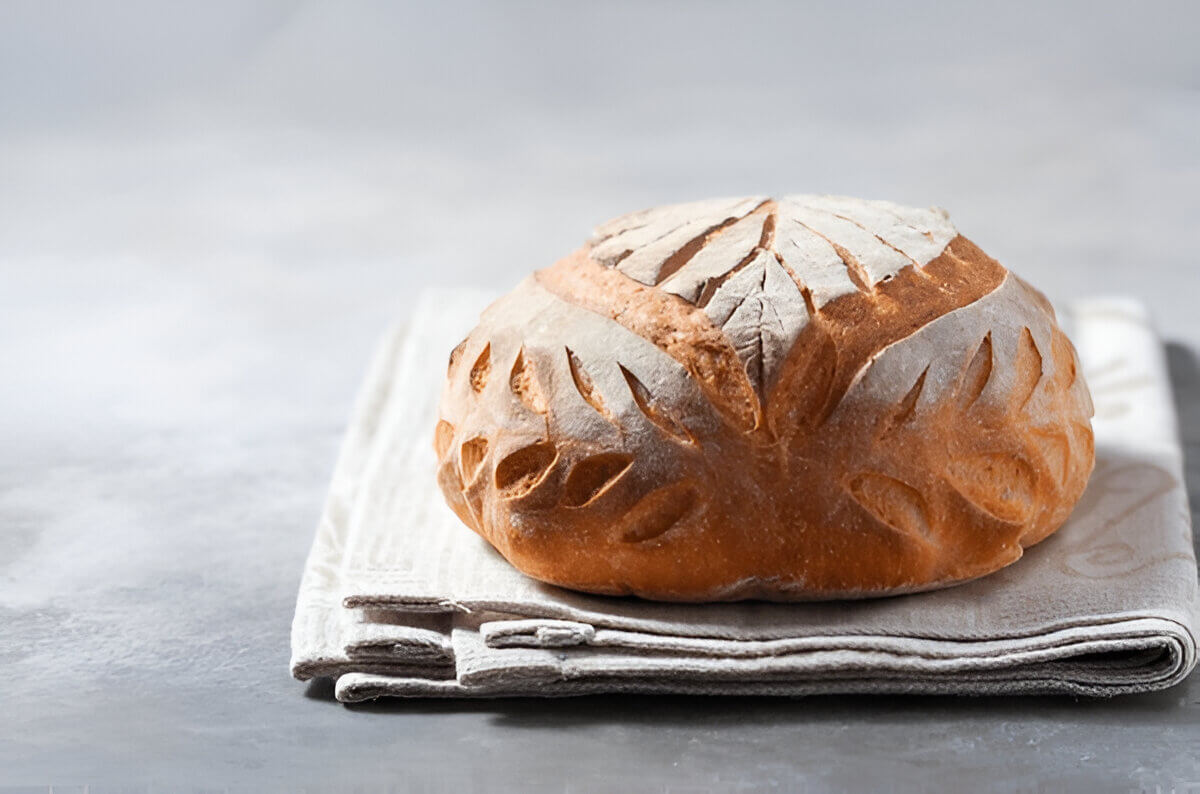
Sourdough bread has gained popularity for its unique flavor and artisanal appeal. As gluten-free diets rise due to health or preference, questions about sourdough’s fit into these diets arise. This text explores fermentation’s impact on gluten levels and examines sourdough’s suitability for those with gluten sensitivity or celiac disease, while offering tips on making a gluten-free version at home. Discover the truth about sourdough in a gluten-free lifestyle.
The Growing Popularity of Sourdough Bread
Sourdough bread has seen a remarkable surge in popularity in recent years, captivating the attention of both amateur bakers and seasoned chefs alike. This rise can be attributed to several factors, including its unique flavor profile, health benefits, and the growing trend towards artisan bread-making.
Unlike traditional bread that relies on commercial yeast for fermentation, sourdough is made using a natural starter, a mixture of flour and water that captures wild yeast and bacteria from the environment. This process not only gives sourdough its distinctive tangy taste but also contributes to its digestibility. For those following a gluten-free diet, this aspect is particularly appealing as the long fermentation process can break down some gluten proteins, making it easier to digest for individuals with mild sensitivities.
The artisan bread movement has further fueled interest in sourdough. As consumers increasingly seek out handmade products with authentic flavors, sourdough stands out as a symbol of craftsmanship and tradition. Bakers take pride in perfecting their starters and experimenting with different flours to create loaves that are not only delicious but also visually stunning.
In essence, sourdough bread embodies a return to traditional methods in an era dominated by convenience foods. Its growing popularity reflects a broader cultural shift towards valuing quality over quantity, celebrating the time-honored art of baking while meeting modern dietary preferences.
The Science Behind Sourdough Fermentation

The science behind sourdough fermentation is a fascinating blend of biology and chemistry, resulting in the unique flavors and textures that sourdough bread is celebrated for. At the heart of this process are two primary microorganisms: lactic acid bacteria and yeast. These organisms work symbiotically within the dough to create a complex fermentation process.
Lactic acid bacteria play a crucial role in the sourdough fermentation process by breaking down sugars and producing lactic acid. This not only contributes to the distinctive tangy flavor of sourdough but also helps preserve the bread by lowering its pH, making it less susceptible to spoilage.
Meanwhile, yeast in sourdough acts as a leavening agent. It consumes carbohydrates present in the flour, releasing carbon dioxide gas that causes the dough to rise. The presence of both yeast and lactic acid bacteria ensures that while the dough is rising, it is also developing depth of flavor.
An additional benefit of this fermentation process is its impact on gluten breakdown. During fermentation, enzymes break down some gluten proteins into simpler compounds, which can make sourdough easier to digest for some individuals compared to conventional breads.
Overall, understanding these interactions between lactic acid bacteria and yeast provides insight into why traditional sourdough has remained a staple in baking for centuries, its natural processes not only enhance flavor but also contribute to nutritional benefits.
Does Fermentation Reduce Gluten Content in Sourdough?
Fermentation plays a fascinating role in the world of baking, particularly when it comes to sourdough bread. One of the most intriguing aspects is its potential to reduce gluten content compared to regular bread. During the fermentation process, naturally occurring bacteria and yeasts break down some of the gluten proteins present in the dough. This enzymatic activity can lead to a reduction in overall gluten levels, making sourdough an attractive option for those who are sensitive to gluten.
In comparing gluten content between sourdough and regular bread, studies have shown that while sourdough may not be completely free of gluten, its levels are often lower due to this prolonged fermentation process. The natural leavening agents in sourdough work over time to partially degrade gluten proteins, which can make it easier for some people with mild sensitivities to digest.
However, it’s important to note that for individuals with celiac disease or severe gluten intolerance, even reduced-gluten products like sourdough may not be safe. For those without such conditions but who are looking for a potentially more digestible alternative to traditional bread, exploring the nuanced flavors and textures of sourdough might just offer both culinary delight and digestive comfort.
Sourdough for Gluten Sensitivity
For individuals with gluten sensitivity or intolerance, the question of whether sourdough is a safe option often arises. Sourdough bread is unique due to its fermentation process, which involves naturally occurring lactobacilli and wild yeast. This process not only gives sourdough its distinct tangy flavor but also alters the bread’s digestibility.
The fermentation breaks down some of the gluten proteins in the dough, making it potentially easier to digest for those with mild gluten sensitivities. However, it’s important to note that this does not make sourdough safe for individuals with celiac disease. Celiacs must adhere to a strict gluten-free diet and should avoid any foods containing wheat, barley, or rye (sourdough included) unless it is specifically made from gluten-free grains.
For those with non-celiac gluten sensitivity, sourdough may be more tolerable than other types of bread. However, individual reactions can vary significantly. It’s advisable for anyone considering adding sourdough to their diet to consult with a healthcare professional or nutritionist who can provide personalized advice based on their specific health needs and conditions.
Baking Your Own Gluten-Free Sourdough Bread
Baking your own gluten-free sourdough bread might seem like a daunting task, but with the right ingredients and techniques, it is entirely possible. The key to a successful gluten-free sourdough recipe lies in selecting suitable alternative flours that mimic the texture and taste of traditional sourdough. Popular options include rice flour, buckwheat flour, and sorghum flour, each offering unique flavors and nutritional benefits.
Creating a robust gluten-free starter is crucial as well. This can be achieved by mixing equal parts of your chosen flour with water and allowing it to ferment over several days until it becomes bubbly and active. Patience is essential here, as a strong starter will be the foundation of your bread’s rise and flavor.
When preparing homemade gluten-free bread, consider incorporating psyllium husk or chia seeds into your dough. These ingredients act as binders that help improve the structure and elasticity of the bread without relying on gluten. Additionally, maintaining a slightly wetter dough than traditional recipes can lead to better results since gluten-free flours tend to absorb more moisture.
By experimenting with different combinations of alternative flours for sourdough and following these tips for homemade gluten-free bread, you can enjoy deliciously tangy loaves that cater to dietary needs without compromising on taste or quality.
The Verdict on Sourdough Bread and Gluten-Free Diets
When it comes to managing celiac disease or a gluten sensitivity, choosing the right type of bread can be crucial. Sourdough bread often enters the conversation due to its unique fermentation process, which some believe reduces gluten content. However, for those with celiac disease, sourdough is not considered one of the safest options. This is because most sourdough breads are still made from wheat flour and contain enough gluten to trigger symptoms.
Despite this limitation for celiac sufferers, sourdough does offer nutritional benefits that might appeal to those without severe gluten restrictions. The fermentation process breaks down phytic acid in grains, potentially allowing for better mineral absorption and improved digestion. Additionally, sourdough has a lower glycemic index compared to other breads, which can help regulate blood sugar levels.
For individuals strictly avoiding gluten due to medical reasons, it’s essential to stick with certified gluten-free products. These options ensure that no cross-contamination occurs during production, a critical factor in maintaining health for those with celiac disease.
While sourdough bread offers certain nutritional advantages over conventional breads thanks to its fermentation process, it remains unsuitable for those who must adhere strictly to a gluten-free diet due to health concerns. For these individuals, sticking with certified safe alternatives is the best course of action.